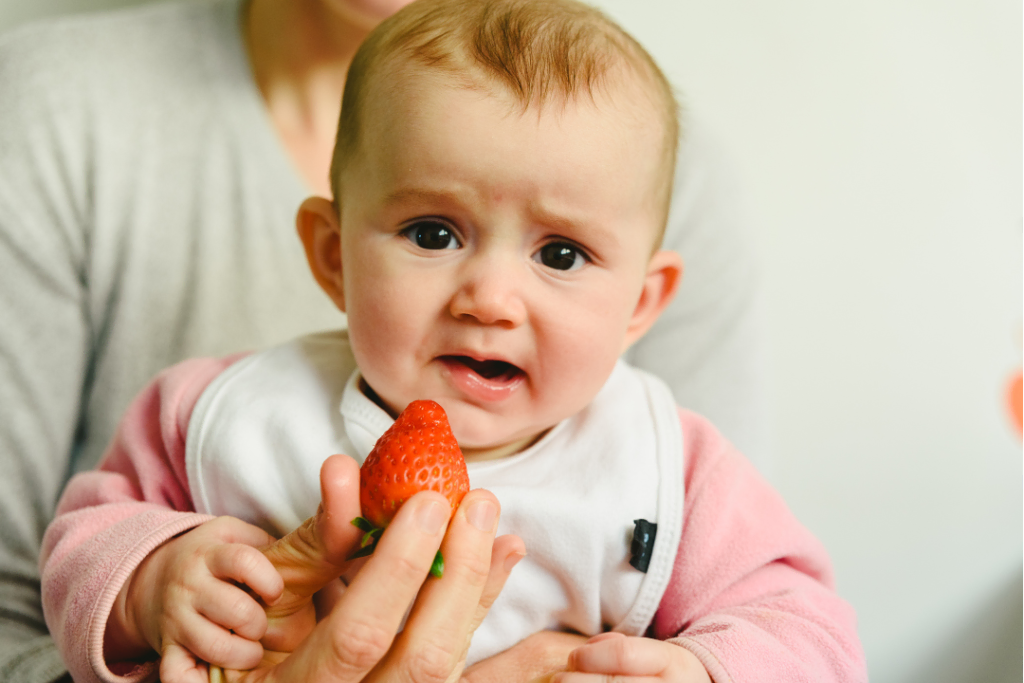I wish someone had shared with me information about what to expect when weaning and how to overcome common challenges. In a previous article, I’ve talked about the stressful weaning journey with my firstborn. A lot of that stress was due to misinformation and ‘noise’ around starting solids. As an OT, mother of 3 and co-author of Weaning Sense, I’ve made it my life’s work to offer support to parents navigating parenthood and all it’s challenges – weaning being one of them. What I would love for you to take away from this article is a sense of preparedness when it comes to weaning. yes, there will be challenges, but being prepared can help make the transition to solids smoother.
Here are some common challenges you may encounter when weaning your baby and tips on how to overcome them:
Refusal of new foods
Your baby may refuse new foods or spit them out. To overcome this challenge, offer small amounts of new foods, be patient and try again another time.
Constipation
As your baby’s digestive system adjusts to solid foods, they may experience constipation. To help prevent this, offer plenty of fluids and fibre-rich whole foods, such as prunes, pears, or peas.
Upset stomach
Some babies may experience an upset stomach or diarrhoea as they adjust to new foods. To help prevent this, introduce new foods slowly and monitor your baby’s reaction.
Regression in breastfeeding
Some babies may want to breastfeed more often when you start to introduce solid foods. To avoid this, offer a breastfeed after solid foods, so your baby is not too hungry.
Frustration and impatience
The weaning process can be frustrating for both you and your baby. Take it slow and be patient with the process. Try to make it fun by offering a variety of foods and textures, and by involving your baby in the process.
Weaning from breastfeeding: How to ensure your baby is still getting the nutrients they need
As we talked about in a previous article, weaning your baby with foods that replicate the nutritional composition of breastmilk is a sound approach. Here are some tips to ensure that your baby is still getting the necessary nutrients during weaning:
- Offer nutrient-rich foods: Offer a variety of nutrient-rich foods, such as fruits, vegetables, whole grains, lean protein, and dairy products.
- Continue to breastfeed or provide formula: Even as your baby starts to eat solid foods, breast milk or formula should still be their main source of nutrition until they are 12 months old. Gradually reduce the frequency of breastfeeding or formula feedings as your baby starts to eat more solid foods.
- Monitor iron intake: Babies need iron for healthy growth and development. Offer iron-rich foods, such as meat, poultry, and legumes.
- Offer healthy fats: Babies need healthy fats for brain development. Offer foods that are rich in healthy fats, such as avocado, nut butters, and fatty fish like salmon.
- Ensure adequate hydration: Offer water in a sippy cup with meals and throughout the day to ensure your baby stays hydrated.
- Lastly, if you are breastfeeding your nutrition is important for you and your baby. Watch this video where Kath shares practical tips to ensure that your nutritional needs are being met, during pregnancy and breastfeeding.
Different approaches to weaning: Which method works best for you and your baby
There are several different approaches to weaning but the best method for you and your baby will depend on your individual preferences and needs. The most common weaning methods include:
Baby-led weaning
This approach involves allowing your baby to feed themselves from about 8 months. Offer soft finger foods, like steamed vegetables or fruit, and let your baby explore and experiment with different textures and flavours.
Mother-led weaning
This approach involves setting a specific time frame for weaning and actively reducing breastfeeding or formula feedings according to a schedule. This method can be appealing for mothers who need to wean quickly due to work or other commitments but can also be too rigid and stressful.
Kath and I believe that the ideal way to wean should not be a case of following strict rules but rather, it should be a collaboration between you, your baby and the advisors who guide you. And that’s where COLLAB weaning comes in.
COLLAB weaning*
COLLAB weaning is an approach that puts your baby at the centre of the weaning process – their age, development, and sensory personality. It encourages moms to guide their babies in line with these factors as well as science and what we know about healthy eating. Very importantly, COLLAB weaning takes the pressure off you and your baby, allowing you to write your own weaning journey.
COLLAB is an acronym that stands for:
CUES: Recognizing and respecting your baby’s cues for readiness will guide you in knowing when to wean. Respecting your baby’s hunger and fullness cues during feeding is crucial for a healthy relationship with food and preventing obesity.
OWN PERSON: Your baby is unique and will have their own preferences for weaning. Understanding your baby’s sensory personality is key to a happy weaning process.
LOW PRESSURE: Take the pressure off yourself and your baby. Weaning is a journey, not a race or competition.
LED BY SCIENCE: Consider scientific research on early infant feeding. For example, introducing solids from 4 months of age does not increase allergy risk and may even be preventative.
AGE APPROPRIATE: Sensible weaning can start around 4 months, but the timing is flexible. If your baby doesn’t enjoy early attempts, it’s fine to stop and try again later.
BABY FRIENDLY: Support your baby’s self-regulation skills, including feeding, to prevent fussy eating in the future.
In summary, COLLAB weaning involves teamwork between you and your baby, and your paediatrician or dietician. By working together, you can create a sensational weaning journey for long-term health.
* Taken from Weaning Sense by Meg Faure and Kath Megaw. For more information about COLLAB weaning, get your copy of Weaning Sense (Quivertree) or download the Parent Sense app for trusted advice, a guided weaning course and dozens of delicious baby-friendly recipes.
Important tips about hot topics
In today’s world, it’s sometimes difficult to know what foods are truly wholesome vs what the latest food trends are. These days, parents have questions about topics like GMO, organic vs full fat, allergens, and more. I want to share some important information about these topics from Kath:
- Don’t stress about organic fruit and veg too much. The term is so loosely used and unregulated in many parts of the world that spending extra money on organic fruit and veggies may not be the best way to prioritise spending.
- Likewise, GMO foods are not as harmful as some would like you to believe. In fact, GMOs might well be the future of feeding a growing world population.
- Spend your money on free range and organic dairy, eggs, and meat. Animal products often contain antibiotics and hormones that affect our bodies. Steer clear of mass-produced products in this basket as much as possible.
- Lastly, know where ingredients come from and how it was processed. This is the overriding principle when choosing ingredients for your baby because despite what the packaging might say, there is a possibility of more additives at every point in the production of food. Without knowing where food is from, you might unknowingly be offering your baby highly processed foods masked as healthy foods.
For more information or to help start your weaning journey sensibly, download Parent Sense and sign up for our 5- week Weaning Sense course presented by Kath. You will come away with all the information you need to make your baby’s weaning journey a wonderful experience.





